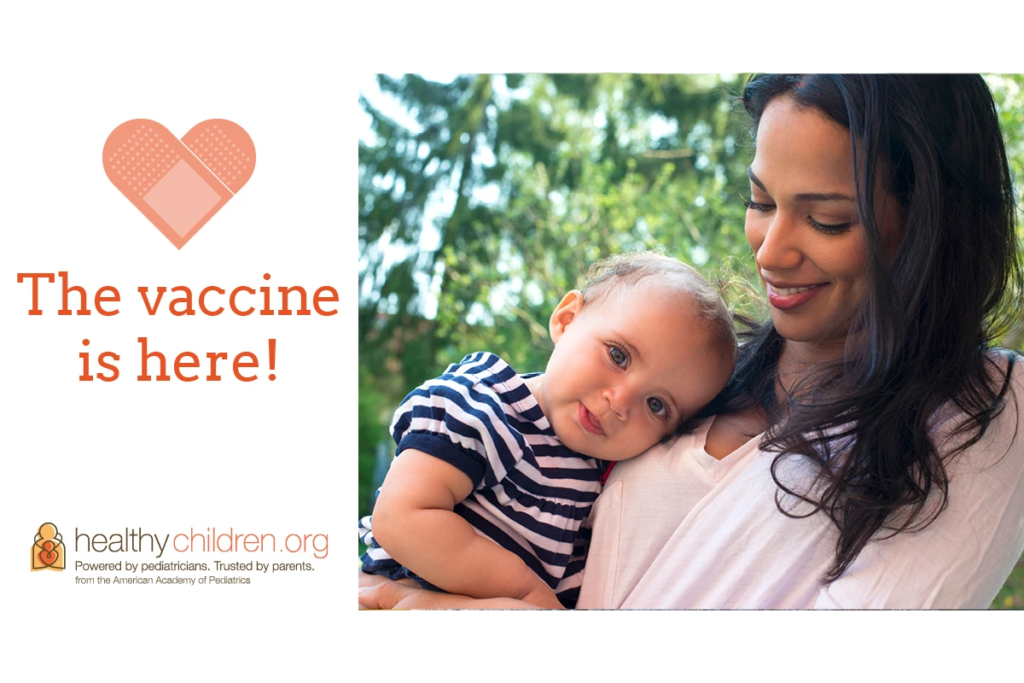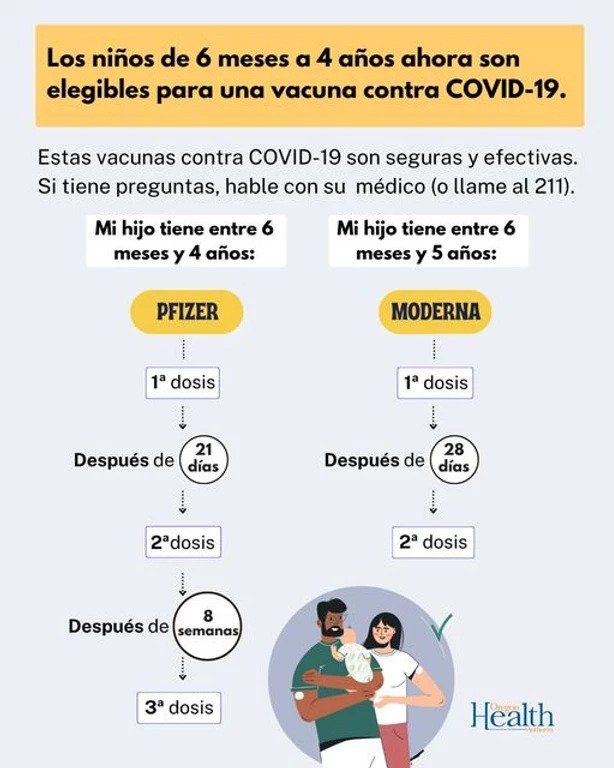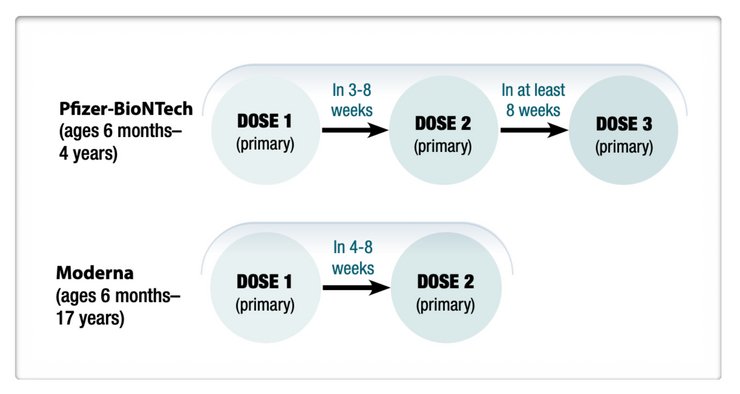It’s Your Turn! COVID Vaccines for Kids Under 5 Have Arrived

e have received a small fraction of the doses we ordered but expect to receive more every week. We will open up appointments as vaccine doses come in, and will post those openings here. Call the office to schedule an appointment. Once the vaccine clinics are full, we will add you to the waiting list. You may also add your child to the waiting list on the patient portal.
We appreciate your patience as we are limited not only by vaccine supplies, but also vaccine clinic availability as we are dealing with high volumes of sick patients. We have all been waiting a long time for our littlest ones to be protected, and we are feeling the same excitement and anticipation you are! We will work as hard as we can to get this age group vaccinated, but if you don’t want to wait there are some links below for mass vaccination clinics happening in the area. We are so happy that it is finally their turn!
Under 5 COVID Vaccine Schedule
Thursday, June 30th — Afternoon
Wednesday, July 6th — Morning
Wednesday, July 6th — Afternoon
We will update this page when we open more vaccine clinics.
Noticias de COVID en Español
La vacuna de Moderna ahora está autorizada para niños de 6 meses a 17 años y la vacuna de Pfizer ahora está autorizada para niños de 6 meses a 4 años. Lee mas en vacunacovid.oregon.gov y facebook.

Vacunas contra el COVID-19 para niños menores de 5 años
FAQs
Both Pfizer and Moderna vaccines were authorized; which one do you have?
Currently we have the Pfizer vaccine for all age groups. If you would rather get the Moderna vaccine, it is available at OHSU. OHA will be continually updating their vaccine clinic blog with information on mass clinic sites that offer both Pfizer and Moderna.
What are the differences in the vaccines?
The main difference between the Pfizer and Moderna vaccines for this age group are the dose and timing. The Pfizer vaccine is a 3 dose series carried out over a minimum of 11 weeks, with the most protection starting at 12 weeks (7 days after the third dose). Currently, the Moderna vaccine is a 2 dose series, 4 weeks apart, with the most protection starting at 6 weeks (14 days after the second dose).

As we learn more, and as we continue to deal with newer variants, the timing and number of doses may change.
The two vaccines use different amounts of mRNA and have other differences in composition. Parents should not choose the vaccine for their child based on the number of doses, because they may be the same number in the end.
The 3-dose vaccine (Pfizer) was first tested using 2 doses. Adding the third dose was found to be more effective at protecting babies and young children from the omicron variant that is that is the most common variant spreading in the United States right now. The vaccine is a 3-dose series.
The 2-dose vaccine (Moderna) was tested using 2 doses. They were found to be safe and effective. Right now, Moderna is studying a third dose of their vaccine. It is possible that the vaccine also may turn into a 3-dose series.
From the AAP’s COVID Vaccines for Kids 6 Months & Older: FAQs for Families
Vacuna contra el COVID para bebés y niños de 6 meses a 5 años: preguntas frecuentes de las familias
Is one better than the other?
While it is difficult to compare the efficacy data for the two vaccines (due to differences in trial protocols), or against the adult vaccine efficacy (those trials were done well before the more recent variants were around), both vaccines are protective and are expected to decrease hospitalizations and ICU stays in young children.
My child has a check-up coming up. Can we get the vaccine then or do we have to have a separate appointment?
As soon as we have ample supply we will be able to offer the vaccine at your regularly-scheduled check-up. Until then we will only be giving COVID vaccines in this age group during vaccine clinics in order to avoid having to waste doses.
Are there side effects of the vaccine?
Like any vaccine, children and babies who receive the COVID vaccine can experience some side effects of their immune system working. Common side effects are pain and redness at the injection site. In the vaccine trials, younger children were more likely to be irritable and drowsy, and 2-5 year olds were more likely to experience pain at the injection site, fever, and fatigue.
Thousands of children were in the studies, and there were no children with serious allergic reactions, heart inflammation or other serious problems related to the vaccines that may worry parents.
From the AAP’s COVID Vaccines for Kids 6 Months & Older: FAQs for Families
Vacuna contra el COVID para bebés y niños de 6 meses a 5 años: preguntas frecuentes de las familias
Do young children even need a vaccine? Don’t they have mild cases?
A lot has changed since 2020, and we now know that the assumption that children do not have serious illness or complications from COVID infection is a myth.
- During the Omicron peak, the hospitalization rates for children under 5 were five times higher compared to Delta. More than half of those hospitalized had no underlying risk factors. CDC
- As of June 24, 2022, more than 2.5 million children under 5 have had COVID infections, and more than 400 of these have died. CDC, AAP, CDC
- As of May 31, 2022, more than 8,000 children have developed MIS-C (multisystem inflammatory syndrome in children), and 69 have died from from MIS-C. CDC
- Like adults, children can experience post-COVID conditions, including long-haul COVID and even an increased risk of developing diabetes, even after mild or asymptomatic infections. Unfortunately, we don’t yet know who is at risk of developing these conditions, or how long they will last. AAP, AAP, CDC
The good news is that vaccination in our littlest ones, just like for older kids and adults, is likely to prevent serious infection, complications, and death related to COVID-19. For example, in one study, two doses of the Pfizer vaccine reduced MIS-C by 91% in youth 12 to 18 years of age.
From the AAP’s What should parents know about the COVID vaccine for kids under 5?
My child already had COVID. Do they really need the vaccine?
Continued COVID infections means continued opportunities for the virus to mutate. Having had an infection is no longer as protective as it was with earlier versions of the virus, and this is especially true for children. Early studies are showing that hybrid immunity (meaning immune protection from both vaccines and infection) may be the most protective against future infections. Nature, GAVI
Dr. Katelyn Jetelina, who has a Masters in Public Health and PhD in Epidemiology and Biostatistics, and is an Assistant Professor of Epidemiology and a mom, has written a helpful article in Time Magazine,
My Toddlers Already Had COVID-19. I’m Still Getting Them Vaccinated Right Away
